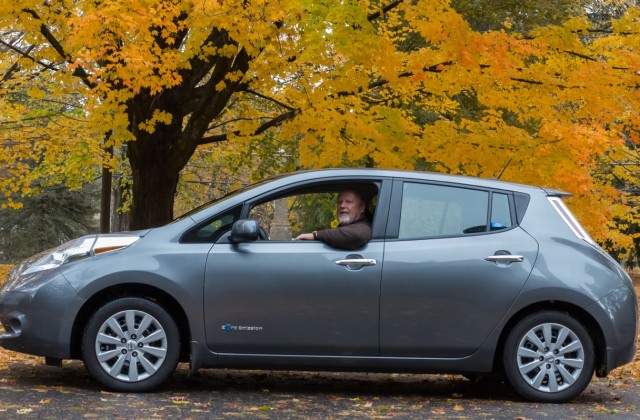Going Electric in Colebrook
A Carbon Negative Family
By David Beers
The Eckert family in Colebrook is more than just carbon neutral, they are carbon negative. Instead of paying for energy, they are making money from the energy that they produce at their home. Bill Eckert, a C.P.A. and retired software company executive, has been keeping detailed records of his household finances to prove the savings.
Upon reaching retirement a few years ago, Eckert and his wife, Ginny, moved down from New Hampshire to be closer to their kids and grandkids. They purchased a ranch up on a small hill with an unobstructed southern exposure in the backyard. Over a year ago, Eckert called a number in a newspaper ad for home solar installation. After that initial solar consultation, he shopped around to find the best deal for a solar lease. Eckert decided against purchasing the solar panels because of the high initial cost ($30,000) and because he didn’t qualify for the substantial tax credits awarded to some homeowners.
In the end, the Eckerts entered into a 20-year lease contract for 40 solar panels (400 square feet) on their roof for a monthly cost that stays the same for the entire lease. Their only upfront cost was the required energy audit, which was less than $100. Each panel has its own inverter that converts the DC power to usable AC power, a much better setup than a solitary inverter because if one panel malfunctions, the others still work. Over the past year, the panels have provided more than enough electrons to power the Eckert’s entire house.
Connecticut is one of a handful of states that requires the power suppliers to give homeowners net metering. This means that when the sun shines, the extra power homeowners produce (beyond their own consumption) is sent out to the grid and the homeowner accumulates power credits. Then they cash in their power credits during the months that the sun is less generous to their roof.
“It’s really like a big battery,” says Eckert. Every February, they settle up their account with Eversource and set it back to zero. If the Eckerts have produced more power than they consumed during the past year, Eversource pays them for the extra power at the going wholesale rate. If the opposite is true, the Eckerts owe Eversource for the extra power needed at the going retail rate.
Because the wholesale rate is so low compared to the retail rate, homeowners want to break even and use as much power as their panels produce on a yearly basis. The Eckerts were producing more than they were using over the course of a year and wanted to adjust that scenario to their economic advantage. Some folks might see this as an opportunity to power an outdoor Jacuzzi or some such indulgence, but Bill Eckert is more practical than that—he started driving an electric car.
This past June, he entered into a two-year lease on a Nissan Leaf all-electric car. No combustion engine under the hood and no exhaust. It is a quiet, luxurious car with a surprisingly quick pick-up, and has an 85-mile range before needing another charge, which works for the kind of driving Bill Eckert does. On one rare extended trip he was able to get a quick 20-minute charge for free at a Nissan dealership. Some shopping centers and office buildings are also now offering free chargers to encourage this technology. There are different kinds of chargers available, with the more expensive ones able to charge a vehicle in less than an hour. The Eckerts purchased a $1,500 charger, the quickest residential charger available on the market, which provides a full charge to an empty battery in five hours.
Before converting to rooftop solar panels and an electric car, the Eckerts spent an average of $180 per month for household electricity and $95 per month for gas. They now spend $130 per month for the solar lease, $20 per month for electricity (the standard minimum charge) and nothing on gas for the Leaf, which has a lease payment of $108 a month. As the result, the Eckerts are ahead (net revenue) by $125 a month. A year of these savings will pay for the garage car charger. After that, every electron saved is an electron earned for the Eckert household. The economics work out well, but Eckert says the larger point is that they are now part of a solution, not a problem.
Photo by Savage Frieze.

